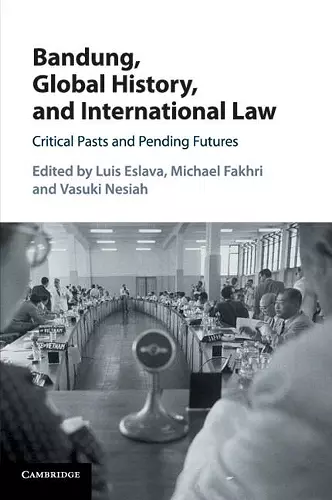Bandung, Global History, and International Law
Critical Pasts and Pending Futures
Luis Eslava editor Michael Fakhri editor Vasuki Nesiah editor
Format:Paperback
Publisher:Cambridge University Press
Published:13th Dec '18
Currently unavailable, and unfortunately no date known when it will be back
This paperback is available in another edition too:
- Hardback£154.00(9781107123991)

This study of the 1955 Bandung Conference is central to the history of international law and the post-colonial world order.
The 1955 Bandung Conference was a key moment in decolonization and the establishment of a new world order. This, the first sustained multi-disciplinary study of Bandung, explores the development of public international law from a Third World perspective as well as the place of Bandung within global intellectual history.In 1955, a conference was held in Bandung, Indonesia that was attended by representatives from twenty-nine nations. Against the backdrop of crumbling European empires, Asian and African leaders forged new alliances and established anti-imperial principles for a new world order. The conference came to capture popular imaginations across the Global South and, as counterpoint to the dominant world order, it became both an act of collective imagination and a practical political project for decolonization that inspired a range of social movements, diplomatic efforts, institutional experiments and heterodox visions of the history and future of the world. In this book, leading international scholars explore what the spirit of Bandung has meant to people across the world over the past decades and what it means today. It analyzes Bandung's complicated and pivotal impact on global history, international law and, most of all, justice struggles after the end of formal colonialism.
'This book is an incredibly rich tool to all those seeking to understand the paths towards the civilizational transitions needed to face the multiple crises of climate, food, poverty, and meaning. It should be of great interest to students and scholars in fields well beyond international law, including anthropology, geography, sociology, global studies, and cultural studies.' Arturo Escobar, University of North Carolina, Chapel Hill
'Until now, there has been no authoritative re-telling of the history of international law that de-centers the Westaphalian myth. Taking Bandung as its inspiration, this book critically engages the third world's resistance to the global north and examines the silences, blind spots and the underbelly of its decolonizing nationalism in re-writing and re-configuring mainstream accounts of the history of international law as well as its operative logics and normative commitments.' James Gathii, Loyola University, Chicago and Trade Policy Centre in Africa (TRAPCA), Arusha
'For some time now, the Bandung conference is regarded as an event whose significance has come to pass along with the spirit of anti-imperial resistance it once symbolized. This book challenges such an assessment not only by revisiting the contested history of the conference but by analyzing its legacy for a rethinking of the international legal order, its past and present.' Saba Mahmood, University of California, Berkeley
'The era of Bandung is over, and its spirit has dissipated. But that does not mean that the history that was made there is no longer relevant or that the spirit cannot be conjured to unimaginable feats in our present day. Bandung, Global History, and International Law mines that old history for nuggets that might inform our mapless present.' Vijay Prashad, Trinity College, Hartford
ISBN: 9781107561045
Dimensions: 228mm x 151mm x 37mm
Weight: 1000g
733 pages